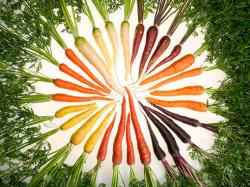USDA Scientists Take An Organic Approach To Improving Carrots
February 10, 2016 | 1 min to read

This post is part of the Science Tuesday feature series on the USDA blog. Check back each week as we showcase stories and news from USDA’s rich science and research portfolio.
Organic carrots are coming into their own. About 14 percent of U.S.-produced carrots are now classified as organic, making carrots one of the highest ranked crops in terms of the total percentage produced organically. With production and demand increasing in recent years, organic-carrot growers need help deciding which varieties to grow. Some varieties perform well as a conventional crop, but not so well under organic conditions. While conventional growers also can fumigate to control nematodes, bacterial diseases and fungal pathogens, organic growers don’t have that option.
That’s why the work of Agricultural Research Service (ARS) plant geneticist Philipp W. Simon and his colleagues is so important. Simon, who is the research leader of ARS’s Vegetable Crops Research Laboratory in Madison, Wisconsin, is leading the five-year Carrot Improvement for Organic Agriculture (CIOA) project that is ultimately aimed at providing information and helping breeders develop carrots that are tastier, more nutritious and better equipped to combat weeds, diseases and pathogens. It is funded with a National Institute of Food and Agriculture, Organic Agriculture Research and Extension Initiative grant.
To read the rest of the story, please go to: USDA Blog
